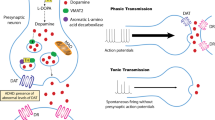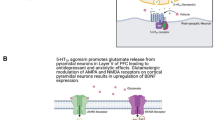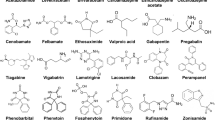Abstract
The objective of this study is to demonstrate that application of rasagiline instead of selegiline with concomitant determination of l-amphetamine and l-methamphetamine in plasma is safe and well tolerated and influences sleep, mood, and motor behavior in patients with Parkinson’s disease on a stable drug therapy. 30 patients, who took 7.5 mg selegiline daily for at least 3 months, were switched to 1 mg rasagiline. Then they were followed over an interval of 4 months. The remaining drug therapy remained stable. This changeover was safe and well tolerated. l-Amphetamine and l-methamphetamine only appeared during selegiline treatment. Motor behavior, motor complications, mood and sleep improved during rasagiline administration. Amphetamine-like derivatives of selegiline could contribute to sleep disturbances, which may be involved in worsening of mood. Motor behavior and motor complications probably became better due to the additional glutamate receptor antagonizing properties of rasagiline in this open label study.

Similar content being viewed by others
References
Antonini G, Morino S, Fiorelli M, Fiorini M, Giubilei F (1997) Selegiline in the treatment of hypersomnolence in myotonic dystrophy: a pilot study. J Neurol Sci 147:167–169
Bar-Am O, Weinreb O, Amit T, Youdim MB (2010) The neuroprotective mechanism of 1-(R)-aminoindan, the major metabolite of the anti-parkinsonian drug rasagiline. J Neurochem 112:1131–1137
Brickenkamp R (2002) Test d2: aufmerksamkeits-belastungs-test. Göttingen, Hogrefe Verlag
Brotchie J, Johnston TH, Visanji NP (2011) 1-Aminoindan, a main metabolite of rasagiline, enhances dopamine release and provides symptomatic benefit in an animal model of Parkinson’s disease. Parkinsonism Relat Disord 2007:102
Buysse DJ, Angst J, Gamma A, Ajdacic V, Eich D, Rossler W (2008) Prevalence, course, and comorbidity of insomnia and depression in young adults. Sleep 31:473–480
Chen JJ, Swope DM, Dashtipour K (2007) Comprehensive review of rasagiline, a second-generation monoamine oxidase inhibitor, for the treatment of Parkinson’s disease. Clin Ther 29:1825–1849
Dimpfel W, Hoffmann J (2011) Effects of rasagiline, its metabolite aminoindan and selegiline on glutamate receptor mediated signalling in the rat hippocampus slice in vitro. BMC Pharmacol 11:2
Dusek P, Buskova J, Ruzicka E, Majerova V, Srp A, Jech R, Roth J, Sonka K (2010) Effects of ropinirole prolonged-release on sleep disturbances and daytime sleepiness in Parkinson disease. Clin Neuropharmacol 33:186–190
Fernandez HH, Chen JJ (2007) Monamine oxidase inhibitors: current and emerging agents for Parkinson disease. Clin Neuropharmacol 30:150–168
Garcia-Borreguero D, Schwarz C, Larrosa O, de la LY, de Garcia YJ (2003) L-DOPA-induced excessive daytime sleepiness in PD: a placebo-controlled case with MSLT assessment. Neurol 61:1008–1010
Gregory AM, Buysse DJ, Willis TA, Rijsdijk FV, Maughan B, Rowe R, Cartwright S, Barclay NL, Eley TC (2011) Associations between sleep quality and anxiety and depression symptoms in a sample of young adult twins and siblings. J Psychosom Res 71:250–255
Hauser RA, Auinger P, Parkinson Study Group (2011) Determination of minimal clinically important change in early and advanced Parkinson’s disease. Mov Disord 26:813–818
He S, Grasing K (2006) L-methamphetamine and selective MAO inhibitors decrease morphine-reinforced and non-reinforced behavior in rats; insights towards selegiline’s mechanism of action. Pharmacol Biochem Behav 85:675–688
Kahn-Greene ET, Killgore DB, Kamimori GH, Balkin TJ, Killgore WD (2007) The effects of sleep deprivation on symptoms of psychopathology in healthy adults. Sleep Med 8:215–221
Killgore WD (2010) Effects of sleep deprivation on cognition. Prog Brain Res 185:105–129
Kronstrand R, Ahlner J, Dizdar N, Larson G (2003) Quantitative analysis of desmethylselegiline, methamphetamine, and amphetamine in hair and plasma from Parkinson patients on long-term selegiline medication. J Anal Toxicol 27:135–141
Laine K, Anttila M, Huupponen R, Maki-Ikola O, Heinonen E (2000) Multiple-dose pharmacokinetics of selegiline and desmethylselegiline suggest saturable tissue binding. Clin Neuropharmacol 23:22–27
Lecht S, Haroutiunian S, Hoffman A, Lazarovici P (2007) Rasagiline—a novel MAO B inhibitor in Parkinson’s disease therapy. Ther Clin Risk Manag 3:467–474
Mayer G, Ewert MK, Hephata K (1995) Selegeline hydrochloride treatment in narcolepsy. A double-blind, placebo-controlled study. Clin Neuropharmacol 18:306–319
Nishida K, Itoh S, Inoue N, Kudo K, Ikeda N (2006) High-performance liquid chromatographic-mass spectrometric determination of methamphetamine and amphetamine enantiomers, desmethylselegiline and selegiline, in hair samples of long-term methamphetamine abusers or selegiline users. J Anal Toxicol 30:232–237
Pollo A, Benedetti F (2009) The placebo response: neurobiological and clinical issues of neurological relevance. Prog Brain Res 175:283–294
Przuntek H, Bittkau S, Bliesath H, Buttner U, Fuchs G, Glass J, Haller H, Klockgether T, Kraus P, Lachenmayer L, Müller D, Müller T, Rathay B, Sgonina J, Steinijans V, Teshmar E, Ulm G, Volc D (2002) Budipine provides additional benefit in patients with Parkinson disease receiving a stable optimum dopaminergic drug regimen. Arch Neurol 59:803–806
Rascol O, Brooks DJ, Melamed E, Oertel W, Poewe W, Stocchi F, Tolosa E (2005) Rasagiline as an adjunct to levodopa in patients with Parkinson’s disease and motor fluctuations (LARGO, Lasting effect in Adjunct therapy with Rasagiline Given Once daily, study): a randomised, double-blind, parallel-group trial. Lancet 365:947–954
Reinish LW, MacFarlane JG, Sandor P, Shapiro CM (1995) REM changes in narcolepsy with selegiline. Sleep 18:362–367
Roca J, Fuentes LJ, Marotta A, Lopez-Ramon MF, Castro C, Lupianez J, Martella D (2012) The effects of sleep deprivation on the attentional functions and vigilance. Acta Psychol (Amst) 140:164–176
Roselaar SE, Langdon N, Lock CB, Jenner P, Parkes JD (1987) Selegiline in narcolepsy. Sleep 10:491–495
Shoulson I, Oakes D, Fahn S, Lang A, Langston JW, LeWitt P, Olanow CW, Penney JB, Tanner C, Kieburtz K, Rudolph A (2002) Impact of sustained deprenyl (selegiline) in levodopa-treated Parkinson’s disease: a randomized placebo-controlled extension of the deprenyl and tocopherol antioxidative therapy of parkinsonism trial. Ann Neurol 51:604–612
Siu EC, Tyndale RF (2008) Selegiline is a mechanism-based inactivator of CYP2A6 inhibiting nicotine metabolism in humans and mice. J Pharmacol Exp Ther 324:992–999
Taylor DJ (2008) Insomnia and depression. Sleep 31:447–448
Taylor DJ, Lichstein KL, Durrence HH (2003) Insomnia as a health risk factor. Behav Sleep Med 1:227–247
Thorpy M (2007) Therapeutic advances in narcolepsy. Sleep Med 8:427–440
Trenkwalder C, Kies B, Rudzinska M, Fine J, Nikl J, Honczarenko K, Dioszeghy P, Hill D, Anderson T, Myllyla V, Kassubek J, Steiger M, Zucconi M, Tolosa E, Poewe W, Surmann E, Whitesides J, Boroojerdi B, Chaudhuri KR (2010) Rotigotine effects on early morning motor function and sleep in Parkinson’s disease: a double-blind, randomized, placebo-controlled study (RECOVER). Mov Disord 26:90–99
Verhagen ML, Del DP, van den MP, Fang J, Mouradian MM, Chase TN (1998) Amantadine as treatment for dyskinesias and motor fluctuations in Parkinson’s disease. Neurol 50:1323–1326
Waters CH, Sethi KD, Hauser RA, Molho E, Bertoni JM (2004) Zydis selegiline reduces off time in Parkinson’s disease patients with motor fluctuations: a 3 month, randomized, placebo-controlled study. Mov Disord 19:426–432
Conflict of interest
Thomas Müller, Walter Dimpfel and Christian Oehlwein received honoraria for the performance of this trial. Josef Hoffmann is an employee of TEVA pharmaceuticals.
Author information
Authors and Affiliations
Corresponding author
Additional information
Trial Number: EudraCT-Nr.: 2008-002145-22. This trial was supported by TEVA Germany.
Rights and permissions
About this article
Cite this article
Müller, T., Hoffmann, J.A., Dimpfel, W. et al. Switch from selegiline to rasagiline is beneficial in patients with Parkinson’s disease. J Neural Transm 120, 761–765 (2013). https://doi.org/10.1007/s00702-012-0927-3
Received:
Accepted:
Published:
Issue Date:
DOI: https://doi.org/10.1007/s00702-012-0927-3




